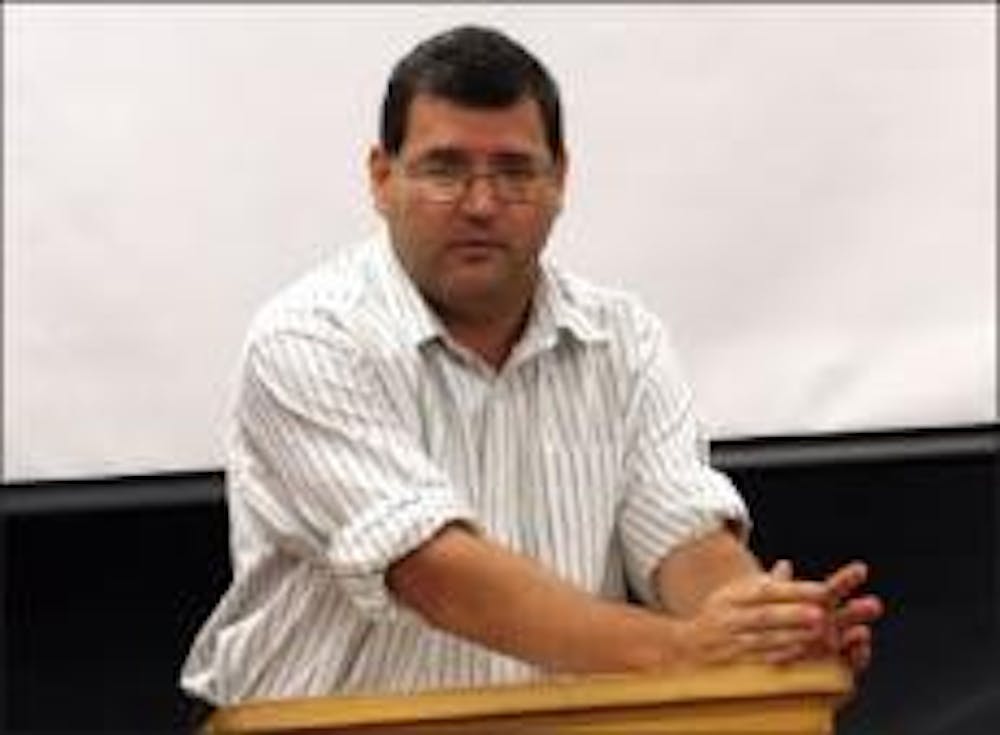
Associate professor of political science Venelin Ganev speaks about the conflict at the Russia-Georgia Forum Friday at Harrison Hall.
The Havighurst Center for Post-Soviet Studies and the department of political science hosted an open forum Sept. 5 on the current situation in Georgia, following the August invasion of the state by Russian military forces.
The discussion was held in Harrison Hall and co-hosted by the Russia Club, Model UN and the international studies program. It consisted of six Miami University faculty members who focused on different aspects of the conflict.
There was not an empty seat at the forum as students and other faculty continued to filter in to a packed room during the hour-and-a-half discussion.
Havighurst Center Director Karen Dawisha initiated planning for the forum after faculty and students who were interested in hearing more about the international crisis approached her.
Dawisha led the forum with a discussion on Moscow's ambitions in the region and recapped recent history in the caucus region-including the future implications of Russia's 2014 Winter Olympics in Sochi (which is near unstable Southern regions) and the international repercussions of the April Bucharest Summit in which NATO and Russian leaders met.
"Georgia is obviously the test case for Russia," Dawisha said. "(If) Russia can emerge as a major power in the region."
Dawisha also connected the August invasion to recent Russian war games in the region as well as Russian Prime Minister Vladimir Putin's military aspirations toward Georgia.
"Russia has failed to stunt Georgia, and has only succeeded in bringing (Georgia President) Mikhail Saakashvili onto the world stage," Dawisha said.
Following her remarks, fellow political professor Venelin Ganev spoke on the European relationship with Russia and the problems of NATO expansion into former Soviet regions.
Taking a more abstract view of the crisis, Ganev presented the problem of the current situation from both a moral and a pragmatic approach, arguing that there seemed to be no way to build consensus with regards to the future of NATO and its candidate member states.
Enjoy what you're reading?
Signup for our newsletter
"Undisciplined small players can be as dangerous as big players, especially in Europe," Ganev said.
Ganev's speech paralleled the current situation to both the events preceding World War I and Gulliver's Travels.
Patrick Haney, professor of political science, and Gulnaz Sharafutdinova, assistant professor of political science and international studies, spoke on the implications for U.S. foreign policy and the energy equation respectively. Haney also touched upon the differences in the responses of U.S. presidential candidates to the conflict.
Scott Kenworthy, assistant professor of comparative religion, and Neringa Klumbyte, assistant professor of anthropology, rounded out the panel.
Kenworthy said the invasion of Georgia could be a response to Western recognition of Kosovar independence earlier this year.
"There is no way for Russia not to see Kosovo as antagonistic," Kenworthy said.
The session ended with a question and answer session that addressed the history of the region, the role of current Russian President Dmitry Medvedev, economic issues in the region and the continuing concern for journalists in Russia.
"The gloves are off," Dawisha said, commenting on the recent murders of three journalists in Russian territory near Georgia.
While students enjoyed the event and encouraged the creation of future open forums on hot topic issues, junior Drew Wallenstein was discouraged that a U.S. perspective took up the majority of the discussion.
"I would have preferred an international approach to the conflict, and a discussion of other actors, like China," Wallenstein said. "There was a question about the European Union's reaction, but it wasn't answered."
Despite this, Wallenstein said that he "learned a lot of the nitty-gritty" about the conflict.
The next Havighurst Center event is Sept. 23rd when Misha Gaidar-Russian political activist, daughter of former Russian Prime Minister Yegor Gaider and founder of Democratic Alternative-will visit Miami.




